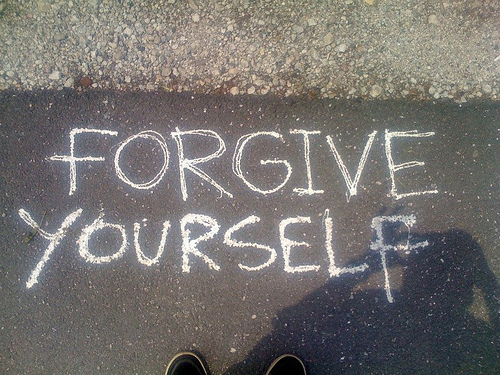There are three things that have the potential to really irritate me on a daily basis: unexpected plot twists on Grey's Anatomy, people showing way too much PDA on the subway, and making mistakes. It's human, and everyone does it, but I swear making mistakes drives me to Death Cab for Cutie-induced mopiness and a cupcake-eating frenzy! If making mistakes and being totally an imperfect human was an Olympic sport, I'd be Bruce Jenner!
What is it about making mistakes, and being called out for them, that makes us feel so uncomfortable? Is it the realization that we're not perfect? Is it the "coulda-woulda-shouldas" that run through our head, filling us with guilt? Is it the fear of people being upset and thinking less of us? Whatever the reason, mistakes from either natural human error or carelessness are part of everyday life. Sometimes those mistakes have messy and unfortunate consequences, and apologies and amends are necessary. But learning how to gracefully make mistakes and recover from them without losing one ounce of self-respect or self-love is the true art. I'm definitely still a novice, but practice makes progress. Here are three of the most helpful things I've learned along the way --
1. Get honest
I admit it -- I used to have what my grandma used to call the "Pinocchio Problem." An avid literature lover, she obviously meant this metaphorically, but it stuck with me. When I was younger, I always associated making mistakes with getting in trouble, so when someone would confront me about doing something wrong, I would sneakily try to cover it up. I was a very good embellisher, but I usually ended up feeling twice as guilty for not only making the mistake, but also lying about it.
One day it occurred to me that mistakes didn't mean time out, and it might be a good idea to respond to my inherent humanness with the maturity of an adult instead of the fear of a cranky 5-year-old. So I started telling the truth. "Yup, I did that," "That was me -- my bad," and "I'm so sorry," became pocket phrases that I could pull out to sincerely address my wrongdoings whether or not I had been caught. I was shocked to hear that the response I got was usually "no worries," because I had been worried about it for days!
Not being honest about a mistake I've made, whether is be forgetting to do a household chore or making a serious typo in a client email, is like literally trying to pretend I'm not human. And assuming that the other person won't understand and forgive me is assuming they aren't human either! Part of being a member of the human race is living and cohabiting with other mistake-making and imperfect people, and pretending I'm above that or better than that will lead to feeling lonely and isolated.
So I got human. And when I got human -- I got honest. And when I got honest, that icky post-mistake feeling went away much more quickly, I felt more connected to my co-workers and friends, and my nose stayed exactly the right size.
2. Change your perspective -- Mistakes are gifts
There is a form of healthy guilt. When we have done something hurtful to someone we love or broken a rule, it is natural and healthy to feel a sense of guilt and remorse for what we have done. It is that feeling of healthy guilt which enables us to apologize, to reflect on what we have done, and to do better, and be better, in the future.
However, there is also a form of unhealthy guilt. Unhealthy guilt is that nagging, persistent, pit-of-my-stomach feeling that we experience long after we've made a mistake. This form of guilt does not make us more self-aware or a better friend -- it only makes us more uncomfortable in our own skin. It slowly chips away at our self-esteem. It is not useful.
When I notice myself going into unhealthy guilt, I pause, take out my journal and try to change my perspective. When I start going down that black hole, I try to look at the gifts of that mistake. There is actually always something to TAKE from a mistake. Sometimes the gift is that I am simply reminded of my humanness and my humility is restored (which really sucks for my ego!). Sometimes the gift is some awareness about a personality trait that no longer serves me -- like jealousy or nosiness. Sometimes the gift of a mistake is actually the deepening of intimacy with someone that occurs by admitting to my wrongs. But if I can change my perspective and see what gift I can take away from my mistake, the unhealthy guilt will lose power over me, and I can move onwards and upwards.
3. Don't wait for someone to forgive you to let yourself off the hook
When we're attaching a frame to the wall, it's hard to know when to stop hammering the nail. Even when it has no further to go, we sometimes still hammer away hoping to make the fixture even more secure. But usually, once the nail is in -- it's in, that's it.
When we've made a mistake, all we want is the other person to forgive us. Even if it was a small or insignificant error, the person telling us they aren't upset just has a way of calming the nerves. I know for myself, until I get that reassurance, I really have to fight the urge to beat myself up, which I illogically believe will minimize the consequences of my mistake. My instinct is to pick up the hammer of self-criticism and hammer away, even if the nail has no where else to go. Clearly, that doesn't work.
Let yourself off the hook (no pun intended). Don't wait for the other person's forgiveness to learn your lesson and move on. Don't berate yourself hoping that it will change the situation. It won't. Even if the person's forgiveness never comes (which usually rarely happens), you still need to live with yourself, which isn't fun if you're constantly hammering away. We can't guarantee that another person will forgive us or that we won't face consequences for our mistakes. We can, however, determine how we experience our mistakes and how we feel in our own skin.
At the end of the day, I wish you happy mistake-making! The worst thing and the best thing that can happen as a result of a mistake is that you learn, and luckily, those are pretty good odds to be faced with.

